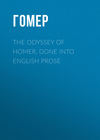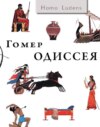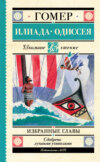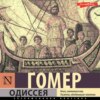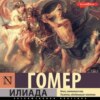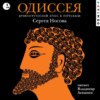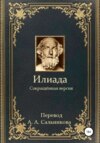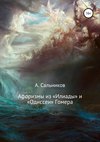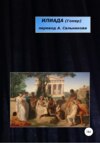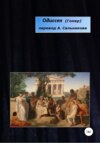Loe raamatut: «The Odyssey of Homer, Done into English Prose»
PREFACE
There would have been less controversy about the proper method of Homeric translation, if critics had recognised that the question is a purely relative one, that of Homer there can be no final translation. The taste and the literary habits of each age demand different qualities in poetry, and therefore a different sort of rendering of Homer. To the men of the time of Elizabeth, Homer would have appeared bald, it seems, and lacking in ingenuity, if he had been presented in his antique simplicity. For the Elizabethan age, Chapman supplied what was then necessary, and the mannerisms that were then deemed of the essence of poetry, namely, daring and luxurious conceits. Thus in Chapman's verse Troy must 'shed her towers for tears of overthrow,' and when the winds toss Odysseus about, their sport must be called 'the horrid tennis.'
In the age of Anne, 'dignity' and 'correctness' had to be given to Homer, and Pope gave them by aid of his dazzling rhetoric, his antitheses, his netteté, his command of every conventional and favourite artifice. Without Chapman's conceits, Homer's poems would hardly have been what the Elizabethans took for poetry; without Pope's smoothness, and Pope's points, the Iliad and Odyssey would have seemed rude, and harsh in the age of Anne. These great translations must always live as English poems. As transcripts of Homer they are like pictures drawn from a lost point of view. Chaque siecle depuis le xvi a ue de ce cote son belveder different. Again, when Europe woke to a sense, an almost exaggerated and certainly uncritical sense, of the value of her songs of the people, of all the ballads that Herder, Scott, Lonnrot, and the rest collected, it was commonly said that Homer was a ballad-minstrel, that the translator must imitate the simplicity, and even adopt the formulae of the ballad. Hence came the renderings of Maginn, the experiments of Mr. Gladstone, and others. There was some excuse for the error of critics who asked for a Homer in ballad rhyme. The Epic poet, the poet of gods and heroes, did indeed inherit some of the formulae of the earlier Volks-lied. Homer, like the author of The Song of Roland, like the singers of the Kalevala, uses constantly recurring epithets, and repeats, word for word, certain emphatic passages, messages, and so on. That custom is essential in the ballad, it is an accident not the essence of the epic. The epic is a poem of complete and elaborate art, but it still bears some birthmarks, some signs of the early popular chant, out of which it sprung, as the garden-rose springs from the wild stock, When this is recognised the demand for ballad-like simplicity and 'ballad-slang' ceases to exist, and then all Homeric translations in the ballad manner cease to represent our conception of Homer. After the belief in the ballad manner follows the recognition of the romantic vein in Homer, and, as a result, came Mr. Worsley's admirable Odyssey. This masterly translation does all that can be done for the Odyssey in the romantic style. The smoothness of the verse, the wonderful closeness to the original, reproduce all of Homer, in music and in meaning, that can be rendered in English verse. There still, however, seems an aspect Homeric poems, and a demand in connection with Homer to be recognised, and to be satisfied.
Sainte-Beuve says, with reference probably to M. Leconte de Lisle's prose version of the epics, that some people treat the epics too much as if the were sagas. Now the Homeric epics are sagas, but then they are the sagas of the divine heroic age of Greece, and thus are told with an art which is not the art of the Northern poets. The epics are stories about the adventures of men living in most respects like the men of our own race who dwelt in Iceland, Norway, Denmark, and Sweden. The epics are, in a way, and as far as manners and institutions are concerned, historical documents. Whoever regards them in this way, must wish to read them exactly as they have reached us, without modern ornament, with nothing added or omitted. He must recognise, with Mr. Matthew Arnold, that what he now wants, namely, the simple truth about the matter of the poem, can only be given in prose, 'for in a verse translation no original work is any longer recognisable.' It is for this reason that we have attempted to tell once more, in simple prose, the story of Odysseus. We have tried to transfer, not all the truth about the poem, but the historical truth, into English. In this process Homer must lose at least half his charm, his bright and equable speed, the musical current of that narrative, which, like the river of Egypt, flows from an indiscoverable source, and mirrors the temples and the palaces of unforgotten gods and kings. Without this music of verse, only a half truth about Homer can be told, but then it is that half of the truth which, at this moment, it seems most necessary to tell. This is the half of the truth that the translators who use verse cannot easily tell. They MUST be adding to Homer, talking with Pope about 'tracing the mazy lev'ret o'er the lawn,' or with Mr. Worsley about the islands that are 'stars of the blue Aegaean,' or with Dr. Hawtrey about 'the earth's soft arms,' when Homer says nothing at all about the 'mazy lev'ret,' or the 'stars of the blue Aegaean,' or the 'soft arms' of earth. It would be impertinent indeed to blame any of these translations in their place. They give that which the romantic reader of poetry, or the student of the age of Anne, looks for in verse; and without tags of this sort, a translation of Homer in verse cannot well be made to hold together.
There can be then, it appears, no final English translation of Homer. In each there must be, in addition to what is Greek and eternal, the element of what is modern, personal, and fleeting. Thus we trust that there may be room for 'the pale and far-off shadow of a prose translation,' of which the aim is limited and humble. A prose translation cannot give the movement and the fire of a successful translation in verse; it only gathers, as it were, the crumbs which fall from the richer table, only tells the story, without the song. Yet to a prose translation is permitted, perhaps, that close adherence to the archaisms of the epic, which in verse become mere oddities. The double epithets, the recurring epithets of Homer, if rendered into verse, delay and puzzle the reader, as the Greek does not delay or puzzle him. In prose he may endure them, or even care to study them as the survivals of a stage of taste, which is to be found in its prime in the sagas. These double and recurring epithets of Homer are a softer form of the quaint Northern periphrases, which make the sea the 'swan's bath,' gold, the 'dragon's hoard,' men, the 'ring-givers,' and so on. We do not know whether it is necessary to defend our choice of a somewhat antiquated prose. Homer has no ideas which cannot be expressed in words that are 'old and plain,' and to words that are old and plain, and, as a rule, to such terms as, being used by the Translators of the Bible, are still not unfamiliar, we have tried to restrict ourselves. It may be objected, that the employment of language which does not come spontaneously to the lips, is an affectation out of place in a version of the Odyssey. To this we may answer that the Greek Epic dialect, like the English of our Bible, was a thing of slow growth and composite nature, that it was never a spoken language, nor, except for certain poetical purposes, a written language. Thus the Biblical English seems as nearly analogous to the Epic Greek, as anything that our tongue has to offer.
The few foot-notes in this book are chiefly intended to make clear some passages where there is a choice of reading. The notes at the end, which we would like to have written in the form of essays, and in company with more complete philological and archaeological studies, are chiefly meant to elucidate the life of Homer's men. We have received much help from many friends, and especially from Mr. R. W. Raper, Fellow of Trinity College, Oxford and Mr. Gerald Balfour, Fellow of Trinity College, Cambridge, who has aided us with many suggestions while the book was passing through the press.
In the interpretation of B. i.411, ii.191, v.90, and 471, we have departed from the received view, and followed Mr. Raper, who, however, has not been able to read through the proof-sheets further than Book xii.
We have adopted La Roche's text (Homeri Odyssea, J. La Roche, Leipzig, 1867), except in a few cases where we mention our reading in a foot-note.
The Arguments prefixed to the Books are taken, with very slight alterations, from Hobbes' Translation of the Odyssey.
It is hoped that the Introduction added to the second edition may illustrate the growth of those national legends on which Homer worked, and may elucidate the plot of the Odyssey.
PREFACE TO THE THIRD EDITION
Wet owe our thanks to the Rev. E. Warre, of Eton College, for certain corrections on nautical points. In particular, he has convinced us that the raft of Odysseus in B. v. is a raft strictly so called, and that it is not, under the poet's description, elaborated into a ship, as has been commonly supposed. The translation of the passage (B. v.246-261) is accordingly altered.
INTRODUCTION
COMPOSITION AND PLOT OF THE ODYSSEY
The Odyssey is generally supposed to be somewhat the later in date of the two most ancient Greek poems which are concerned with the events and consequences of the Trojan war. As to the actual history of that war, it may be said that nothing is known. We may conjecture that some contest between peoples of more or less kindred stocks, who occupied the isles and the eastern and western shores of the Aegean, left a strong impression on the popular fancy. Round the memories of this contest would gather many older legends, myths, and stories, not peculiarly Greek or even 'Aryan,' which previously floated unattached, or were connected with heroes whose fame was swallowed up by that of a newer generation. It would be the work of minstrels, priests, and poets, as the national spirit grew conscious of itself, to shape all these materials into a definite body of tradition. This is the rule of development – first scattered stories, then the union of these into a NATIONAL legend. The growth of later national legends, which we are able to trace, historically, has generally come about in this fashion. To take the best known example, we are able to compare the real history of Charlemagne with the old epic poems on his life and exploits. In these poems we find that facts are strangely exaggerated, and distorted; that purely fanciful additions are made to the true records, that the more striking events of earlier history are crowded into the legend of Charles, that mere fairy tales, current among African as well as European peoples, are transmuted into false history, and that the anonymous characters of fairy tales are converted into historical personages. We can also watch the process by which feigned genealogies were constructed, which connected the princely houses of France with the imaginary heroes of the epics. The conclusion is that the poetical history of Charlemagne has only the faintest relations to the true history. And we are justified in supposing that, quite as little of the real history of events can be extracted from the tale of Troy, as from the Chansons de Geste.
By the time the Odyssey was composed, it is certain that a poet had before him a well-arranged mass of legends and traditions from which he might select his materials. The author of the Iliad has an extremely full and curiously consistent knowledge of the local traditions of Greece, the memories which were cherished by Thebans, Pylians, people of Mycenae, of Argos, and so on. The Iliad and the Odyssey assume this knowledge in the hearers of the poems, and take for granted some acquaintance with other legends, as with the story of the Argonautic Expedition. Now that story itself is a tissue of popular tales, – still current in many distant lands, – but all woven by the Greek genius into the history of Iason.
The history of the return of Odysseus as told in the Odyssey, is in the same way, a tissue of old marchen.
These must have existed for an unknown length of time before they gravitated into the cycle of the tale of Troy.
The extraordinary artistic skill with which legends and myths, originally unconnected with each other, are woven into the plot of the Odyssey, so that the marvels of savage and barbaric fancy become indispensable parts of an artistic whole, is one of the chief proofs of the unity of authorship of that poem. We now go on to sketch the plot, which is a marvel of construction.
Odysseus was the King of Ithaca, a small and rugged island on the western coast of Greece. When he was but lately married to Penelope, and while his only son Telemachus was still an infant, the Trojan war began. It is scarcely necessary to say that the object of this war, as conceived of by the poets, was to win back Helen, the wife of Menelaus, from Paris, the son of Priam, King of Troy. As Menelaus was the brother of Agamemnon, the Emperor, so to speak, or recognised chief of the petty kingdoms of 'Greece, the whole force of these kingdoms was at his disposal. No prince came to the leaguer of Troy from a home more remote than that of Odysseus. When Troy was taken, in the tenth year of the war, his homeward voyage was the longest and most perilous.
The action of the Odyssey occupies but the last six weeks of the ten years during which Odysseus was wandering. Two nights in these six weeks are taken up, however, by his own narrative of his adventures (to the Phaeacians, p. xx) in the previous ten years. With this explanatory narrative we must begin, before coming to the regular action of the poem.
After the fall of Troy, Odysseus touched at Ismarus, the city of a Thracian people, whom he attacked and plundered, but by whom he was at last repulsed. The north wind then carried his ships to Malea, the extreme southern point of Greece. Had he doubled Malea safely, he would probably have reached Ithaca in a few days, would have found Penelope unvexed by wooers, and Telemachus a boy of ten years old. But this was not to be.
The 'ruinous winds' drove Odysseus and his ships for ten days, and on the tenth they touched the land of the Lotus- Eaters, whose flowery food causes sweet forgetfulness. Lotus-land was possibly in Western Libya, but it is more probable that ten days' voyage from the southern point of Greece, brought Odysseus into an unexplored region of fairy-land. Egypt, of which Homer had some knowledge, was but five days' sail from Crete.
Lotus-land, therefore, being ten days' sail from Malea, was well over the limit of the discovered world. From this country Odysseus went on till he reached the land of the lawless Cyclopes, a pastoral people of giants. Later Greece feigned that the Cyclopes dwelt near Mount Etna, in Sicily. Homer leaves their place of abode in the vague. Among the Cyclopes, Odysseus had the adventure on which his whole fortunes hinged. He destroyed the eye of the cannibal giant, Polyphemus, a son of Poseidon, the God of the Sea. To avenge this act, Poseidon drove Odysseus wandering for ten long years, and only suffered him to land in Ithaca, 'alone, in evil case, to find troubles in his house.' This is a very remarkable point in the plot. The story of the crafty adventurer and the blinding of the giant, with the punning device by which the hero escaped, exists in the shape of a detached marchen or fairy-tale among races who never heard of Homer. And when we find the story among Oghuzians, Esthonians, Basques, and Celts, it seems natural to suppose that these people did not break a fragment out of the Odyssey, but that the author of the Odyssey took possession of a legend out of the great traditional store of fiction. From the wide distribution of the tale, there is reason to suppose that it is older than Homer, and that it was not originally told of Odysseus, but was attached to his legend, as floating jests of unknown authorship are attributed to eminent wits. It has been remarked with truth that in this episode Odysseus acts out of character, that he is foolhardy as well as cunning. Yet the author of the Odyssey, so far from merely dove-tailing this story at random into his narrative, has made his whole plot turn on the injury to the Cyclops. Had he not foolishly exposed himself and his companions, by his visit to the Cyclops, Odysseus would never have been driven wandering for ten weary years. The prayers of the blinded Cyclops were heard and fulfilled by Poseidon.
From the land of the Cyclops, Odysseus and his company sailed to the Isle of Aeolus, the king of the winds. This place too is undefined; we only learn that, even with the most favourable gale, it was ten days' sail from Ithaca. In the Isle of Aeolus Odysseus abode for a month, and then received from the king a bag in which all the winds were bound, except that which was to waft the hero to his home. This sort of bag was probably not unfamiliar to superstitious Greek sailors who had dealings with witches, like the modern wise women of the Lapps. The companions of the hero opened the bag when Ithaca was in sight, the winds rushed out, the ships were borne back to the Aeolian Isle, and thence the hero was roughly dismissed by Aeolus. Seven days' sail brought him to Lamos, a city of the cannibal Laestrygonians. Their country, too, is in No-man's-land, and nothing can be inferred from the fact that their fountain was called Artacia, and that there was an Artacia in Cyzicus. In Lamos a very important adventure befel Odysseus. The cannibals destroyed all his fleet, save one ship, with which he made his escape to the Isle of Circe. Here the enchantress turned part of the crew into swine, but Odysseus, by aid of the god Hermes, redeemed them, and became the lover of Circe. This adventure, like the story of the Cyclops, is a fairy tale of great antiquity. Dr. Gerland, in his Alt Griechische Marchen in der Odyssee, his shown that the story makes part of the collection of Somadeva, a store of Indian tales, of which 1200 A.D. is the approximate date. Circe appears as a Yackshini, and is conquered when an adventurer seizes her flute whose magic music turns men into beasts. The Indian Circe had the habit of eating the animals into which she transformed men.
We must suppose that the affairs with the Cicones, the Lotus-eaters, the Cyclops, Aeolus, and the Laestrygonians, occupied most of the first year after the fall of Troy. A year was then spent in the Isle of Circe, after which the sailors were eager to make for home. Circe commanded them to go down to Hades, to learn the homeward way from the ghost of the Theban prophet Teiresias. The descent into hell, for some similar purpose, is common in the epics of other races, such as the Finns, and the South-Sea Islanders. The narrative of Odysseus's visit to the dead (book xi) is one of the most moving passages in the whole poem.
From Teiresias Odysseus learned that, if he would bring his companions home, he must avoid injuring the sacred cattle of the Sun, which pastured in the Isle of Thrinacia. If these were harmed, he would arrive in Ithaca alone, or in the words of the Cyclops's prayer, I in evil plight, with loss of all his company, on board the ship of strangers, to find sorrow in his house.' On returning to the Isle Aeaean, Odysseus was warned by Circe of the dangers he would encounter. He and his friends set forth, escaped the Sirens (a sort of mermaidens), evaded the Clashing Rocks, which close on ships (a fable known to the Aztecs), passed Scylla (the pieuvre of antiquity) with loss of some of the company, and reached Thrinacia, the Isle of the Sun. Here the company of Odysseus, constrained by hunger, devoured the sacred kine of the Sun, for which offence they were punished by a shipwreck, when all were lost save Odysseus. He floated ten days on a raft, and then reached the isle of the goddess Calypso, who kept him as her lover for eight years.
The first two years after the fall of Troy are now accounted for. They were occupied, as we have seen, by adventures with the Cicones, the Lotus-eaters, the Cyclops, Aeolus, the Laestrygonians, by a year's residence with Circe, by the descent into Hades, the encounters with the Sirens, and Scylla, and the fatal sojourn in the isle of Thrinacia. We leave Odysseus alone, for eight years, consuming his own heart, in the island paradise of Calypso.
In Ithaca, the hero's home, things seem to have passed smoothly till about the sixth year after the fall of Troy. Then the men of the younger generation, the island chiefs, began to woo Penelope, and to vex her son Telemachus. Laertes, the father of Odysseus, was too old to help, and Penelope only gained time by her famous device of weaving and unweaving the web. The wooers began to put compulsion on the Queen, quartering themselves upon her, devouring her substance, and insulting her by their relations with her handmaids. Thus Penelope pined at home, amidst her wasting possessions. Telemachus fretted in vain, and Odysseus was devoured by grief and home-sickness in the isle of Calypso. When he had lain there for nigh eight years, the action of the Odyssey begins, and occupies about six weeks.
DAY 1 (Book i).
The ordained time has now arrived, when by the counsels of the Gods, Odysseus is to be brought home to free his house, to avenge himself on the wooers, and recover his kingdom. The chief agent in his restoration is Pallas Athene; the first book opens with her prayer to Zeus that Odysseus may be delivered. For this purpose Hermes is to be sent to Calypso to bid her release Odysseus, while Pallas Athene in the shape of Mentor, a friend of Odysseus, visits Telemachus in Ithaca. She bids him call an assembly of the people, dismiss the wooers to their homes, and his mother to her father's house, and go in quest of his own father, in Pylos, the city of Nestor, and Sparta, the home of Menelaus. Telemachus recognises the Goddess, and the first day closes.
DAY 2 (Book ii).
Telemachus assembles the people, but he has not the heart to carry out Athene's advice. He cannot send the wooers away, nor turn his mother out of her house. He rather weakly appeals to the wooers' consciences, and announces his intention of going to seek his father. They answer with scorn, but are warned of their fate, which is even at the doors, by Halitherses. His prophecy (first made when Odysseus set out for Troy) tallies with the prophecy of Teiresias, and the prayer of the Cyclops. The reader will observe a series of portents, prophecies, and omens, which grow more numerous and admonishing as their doom draws nearer to the wooers. Their hearts, however, are hardened, and they mock at Telemachus, who, after an interview with Athene, borrows a ship and secretly sets out for Pylos. Athene accompanies him, and his friends man his galley.
DAY 3 (Book iii).
They reach Pylos, and are kindly received by the aged Nestor, who has no news about Odysseus. After sacrifice, Athene disappears.
DAY 4 (Book iii).
The fourth day is occupied with sacrifice, and the talk of Nestor. In the evening Telemachus (leaving his ship and friends at Pylos) drives his chariot into Pherae, half way to Sparta; Peisistratus, the soil of Nestor, accompanies him.
DAY 5 (Book iv).
Telemachus and Peisistratus arrive at Sparta, where Menelaus and Helen receive them kindly.
DAY 6 (Book iv).
Menelaus tells how he himself came home in the eighth year after the fall of Troy. He had heard from Proteus, the Old Man of the Sea, that Odysseus was alive, and a captive on an island of the deep. Menelaus invites Telemachus to Stay with him for eleven days or twelve, which Telemachus declines to do. It will later appear that he made an even longer stay at Sparta, though whether he changed his mind, or whether we have here an inadvertence of the poet's it is hard to determine. This blemish has been used as an argument against the unity of authorship, but writers of all ages have made graver mistakes.
On this same day (the sixth) the wooers in Ithaca learned that Telemachus had really set out to I cruise after his father.' They sent some of their number to lie in ambush for him, in a certain strait which he was likely to pass on his return to Ithaca. Penelope also heard of her son's departure, but was consoled by a dream.
DAY 7 (Book v).
The seventh day finds us again in Olympus. Athene again urges the release of Odysseus; and Hermes is sent to bid Calypso let the hero go. Zeus prophecies that after twenty days sailing, Odysseus will reach Scheria, and the hospitable Phaeacians, a people akin to the Gods, who will convey him to Ithaca. Hermes accomplishes the message to Calypso.
DAYS 8-12-32 (Book v).
These days are occupied by Odysseus in making and launching a raft; on the twelfth day from the beginning of the action he leaves Calypso's isle. He sails for eighteen days, and on the eighteenth day of his voyage (the twenty-ninth from the beginning of the action), he sees Scheria. Poseidon raises a storm against him, and it is not till the thirty-second day from that in which Athene visited Telemachus, that he lands in Scheria, the country of the Phaeacians. Here he is again in fairy land. A rough, but perfectly recognisable form of the Phaeacian myth, is found in an Indian collection of marchen (already referred to) of the twelfth century A.D. Here the Phaeacians are the Vidyidhiris, and their old enemies the Cyclopes, are the Rakshashas, a sort of giants. The Indian Odysseus, who seeks the city of gold, passes by the home of an Indian Aeolus, Satyavrata. His later adventures are confused, and the Greek version retains only the more graceful fancies of the marchen.
DAY 33 (Book vi).
Odysseus meets Nausicaa, daughter of Alcinous, the Phaeacian King, and by her aid, and that of Athene, is favourably received at the palace, and tells how he came from Calypso's island. His name is still unknown to his hosts.
DAY 34 (Books vii, viii, ix, x, xi, xii).
The Phaeacians and Odysseus display their skill in sports. Nausicaa bids Odysseus farewell. Odysseus recounts to Alcinous, and Arete, the Queen, those adventures in the two years between the fall of Troy and his captivity in the island of Calypso, which we have already described (pp. xiii-xvii).
DAY 35 (Book xiii).
Odysseus is conveyed to Ithaca, in the evening, on one of the magical barques of the Phaeacians.
DAY 36 (Books xiii, xiv, xv).
He wakens in Ithaca, which he does not at first recognise He learns from Athene, for the first time, that the wooers beset his house. She disguises him as an old man, and bids him go to the hut of the swineherd Eumaeus, who is loyal to his absent lord. Athene then goes to Lacedaemon, to bring back Telemachus, who has now resided there for a month. Odysseus won the heart of Eumaeus, who of course did not recognise him, and slept in the swineherd's hut, while Athene was waking Telemachus, in Lacedaemon, and bidding him 'be mindful of his return.'
DAY 37 (Book xv).
Is spent by Odysseus in the swineherd's hut. Telemachus reaches Pherae, half-way to Pylos.
DAY 38 (Book xv).
Telemachus reaches Pylos, but does not visit Nestor. To save time he goes at once on board ship, taking with him an unfortunate outlaw, Theoclymenus, a second-sighted man, or the family of Melampus, in which the gift of prophecy was hereditary. The ship passed the Elian coast at night, and evaded the ambush of the wooers. Meanwhile Odysseus was sitting up almost till dawn, listening to the history of Eumaeus, the swineherd.
DAY 39 (Books xv, xvi).
Telemachus reaches the Isle of Ithaca, sends his ship to the city, but himself, by advice of Athene, makes for the hut of Eumaeus, where he meets, but naturally does not recognise, his disguised father. He sends Eumaeus to Penelope with news of his arrival, and then Athene reveals Odysseus to Telemachus. The two plot the death of the wooers. Odysseus bids Telemachus remove, on a favourable opportunity, the arms which were disposed as trophies on the walls of the hall at home. (There is a slight discrepancy between the words of this advice and the manner in which it is afterwards executed.) During this interview, the ship of Telemachus, the wooers who had been in ambush, and Eumaeus, all reached the town of Ithaca. In the evening Eumaeus returned to his hut, where Athene had again disguised Odysseus.
DAY 40 (Books xvii, xviii, xix, xx).
The story is now hastening to its close, and many events are crowded into the fortieth day. Telemachus goes from the swineherd's hut to the city, and calls his guest, Theoclymenus, to the palace. The second-sighted man prophesies of the near revenge of Odysseus. In the afternoon, Odysseus (still disguised) and Eumaeus reach the city, the dog Argos recognises the hero, and dies. Odysseus goes begging through his own hall, and is struck by Antinous, the proudest of the wooers. Late in the day Eumaeus goes home, and Odysseus fights with the braggart beggar Irus. Still later, Penelope appears among the wooers, and receives presents from them. When the wooers have withdrawn, Odysseus and Telemachus remove the weapons from the hall to the armoury. Afterwards Odysseus has an interview with Penelope (who does not recognise him), but he is recognised by his old nurse Eurycleia. Penelope mentions her purpose to wed the man who on the following day, the feast of the Archer-god Apollo, shall draw the bow of Odysseus, and send an arrow through the holes in twelve axe-blades, set up in a row. Thus the poet shows that Odysseus has arrived in Ithaca not a day too soon. Odysseus is comforted by a vision of Athene, and
DAY 41 (Books xx, xxi, xxii, xxiii).
by the ominous prayer uttered by a weary woman grinding at the mill. The swineherd and the disloyal Melanthius arrive at the palace. The wooers defer the plot to kill Telemachus, as the day is holy to Apollo. Odysseus is led up from his seat near the door to a place beside Telemachus at the chief's table. The wooers mock Telemachus, and the second-sighted Theoclymenus sees the ominous shroud of death covering their bodies, and the walls dripping with blood. He leaves the doomed company. In the trial of the bow, none of the wooers can draw it; meanwhile Odysseus has declared himself to the neatherd and the swineherd. The former bars and fastens the outer gates of the court, the latter bids Eurycleia bar the doors of the womens' chambers which lead out of the hall. Odysseus now gets the bow into his hands, strings it, sends the arrow through the axe-blades, and then leaping on the threshold of stone, deals his shafts among the wooers. Telemachus, the neatherd, and Eumaeus, aiding him, he slaughters all the crew, despite the treachery of Melanthius. The paramours of the wooers are hanged, and Odysseus, after some delay, is recognised by Penelope.
